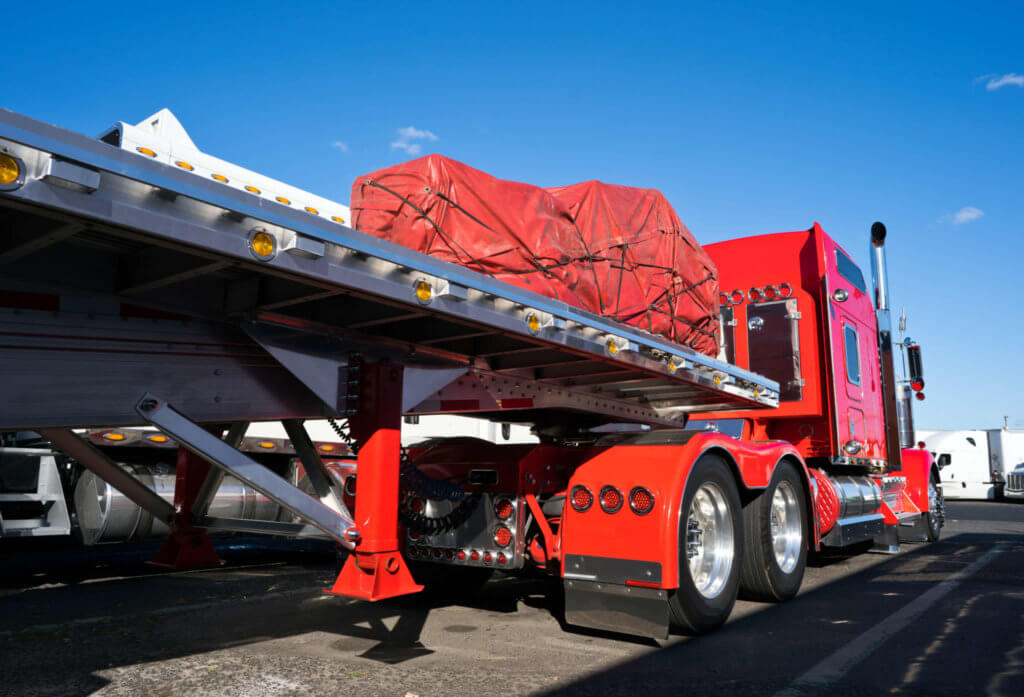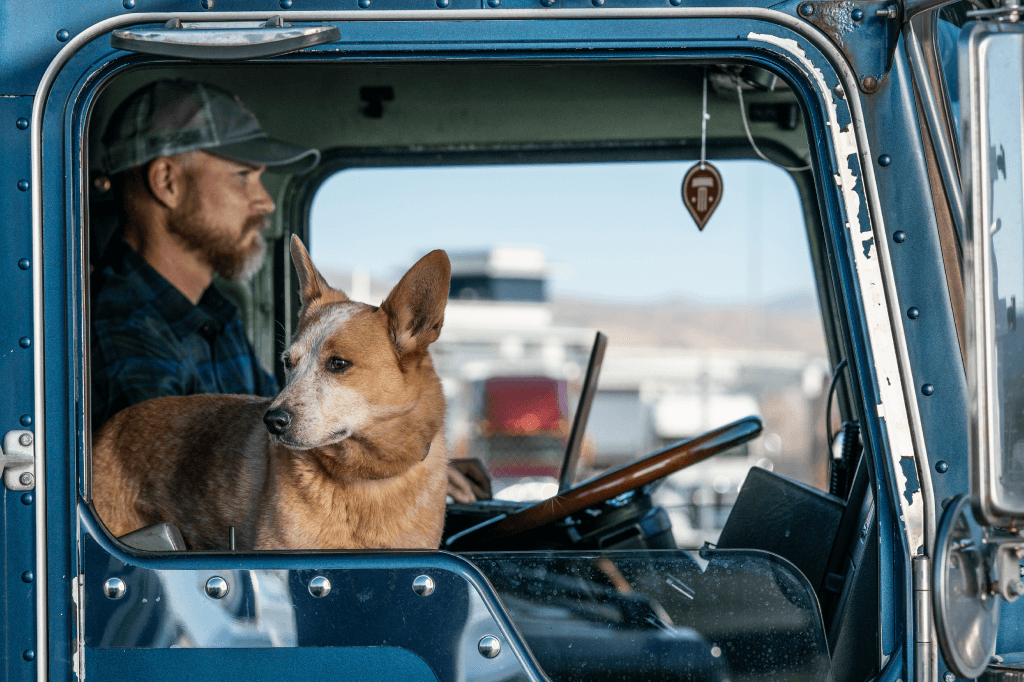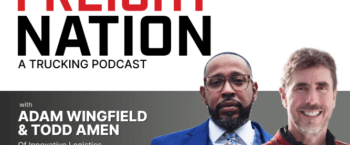Power Only Trucking

Find your next load
Make more money starting now.
If you’re in the trucking business, you may have heard of power-only trucking. But exactly what does power-only mean? Power-only trucking happens when a trucking company provides only a driver and a tractor. The trailer is provided by the shipper, a third-party logistics (3PL) company or, sometimes, through a lease option.
In some cases, the trucking company also owns a fleet of trailers but provides power-only capacity to account for seasonal fluctuations, network imbalances, or other issues. There are also power-only carriers that do not have their own trailer fleets. Instead, they solely take on power-only trucking jobs. Either way, power-only trucking offers an alternative that, depending on the circumstances, can deliver greater flexibility and efficiency and even make the carrier’s job easier.
What is power-only trucking?
What does power-only trucking mean to shippers? Power-only trucking is a flexible option that can work especially well for shippers that get fluctuating levels of perishable items. It’s also helpful for those who tend to store loads on trailers for long periods. In the case of perishable goods, a shipper might have plenty of trailer space but not enough drivers and tractors to ship them on time.
Or maybe a shipper needed to clear out a warehouse, so they loaded everything onto trailers a month ago. Now they’re ready to move the items to a retail location for a liquidation sale but need someone to haul them. In either case, power-only trucking gives shippers the right number of drivers and tractors, generally on short notice.
Power-only vs. regular truckload carriers
Regular truckload carriers provide all the equipment, including a trailer. Power-only carriers provide only the tractor and driver. However, many regular truckload carriers also act as power-only carriers when they have spare drivers and tractors, such as during seasonal downturns in their main business.
Power-only + leased trailer solutions
One scenario in which shippers can take advantage of power-only trucking is combining the power-only capacity with leased trailers. This gives shippers flexibility and scalability to respond to market demands in busy times or when a special situation requires drop-trailer capabilities. When volume declines or a project is complete, a 3PL can end their trailer lease and scale back to provide power-only capacity.
Power-only + private fleet solutions
Some shippers have their own fleet of trucks and trailers. 3PLs can supplement shippers’ private fleet carriers with power units to achieve cost efficiency or to fill in capacity gaps where power-only loads need to be moved. This solution can help correct network imbalances, facilitate the integration of new trailers in a private fleet, and accommodate seasonal volume surges, among other scenarios.
How does power-only trucking work?
When a shipper has a load of freight but no tractor or driver to haul it, they can connect with a power-only trucking company directly or work with a broker to find the right carrier. Power-only trucks use an adjustable fifth-wheel hitch that can safely tow a wide variety of equipment, from reefer trucks to dry vans and perhaps even a flatbed. Different sized trucks have different towing capacities, but standard and four-axle trucks are the most common.
For the best and safest results, it’s important that power-only trucking companies know their equipment’s capacities and limitations. It’s equally important for shippers to know the size and weight of their loads. Also, if they’re shipping hazardous materials, they need to tell the trucking company so they can send the right truck and a properly certified driver.
How shippers use power-only trucking
Shippers can use power-only trucking in different ways. If they have frozen foods, fresh produce, or other perishable items, those goods will require temperature control throughout their journey. The shipper may already have the temperature-controlled reefer units they need but not enough drivers and tractors to haul them. This is especially common when quantities of perishable items vary throughout the year.
Most power-only trucking companies are able to tow reefer trailers that include needed refrigeration. The shipper provides the refrigeration unit, the trucker provides the towing power, and the refrigerated loads safely make their way to their final destination efficiently.
Another common way for shippers to use power-only trucking is to load goods onto trailers well in advance. The trucking industry can be affected by many factors, from supply chain issues to weather conditions. Some shippers find it easiest to keep their own fleet of trailers, load them up as they go along, and then hire a power-only trucking company when they’re actually ready to go.
Power-only with private fleet
Some shippers own a fleet of trailers. They don’t need to worry about working with a leasing company when they’re ready to load up. They may also have some tractors and drivers but need extra capacity during periods of unusual demand. Or they might own just the trailers and work with power-only truckers whenever the trailers need to be moved.
Power-only with leased trailers
Another popular option for shippers is to pair power-only trucking with leased trailers. Rather than purchasing and storing their trailers, they simply work with a leasing company to have them dropped off when needed. The shipper then loads the trailers at their leisure and has a power-only trucking company pick them up when ready.
Common types of power-only loads

One of the biggest advantages of power-only trucking is its flexibility. Power-only trucking companies can transport numerous types of loads. These include, but are not limited to:
- Flatbed trailers
- Shipping containers
- Refrigerated trucks
- Dry vans
- Tankers
Of course, each of these types of loads will require different equipment. Depending on the exact makeup of the load, such as an oversized load or hazardous materials, a driver with specific credentials and training might be required. The more information shippers have about their load, the more successful the power-only trucking experience will be.
Benefits of power only trucking
Power-only trucking can be an excellent solution for carriers, shippers, and receivers. Here are just a few of the biggest perks:
Control
In a power-only trucking arrangement, the shipping company maintains control of the trailers, and the trucking company maintains control of the trucks. Dividing up these two elements allows each business to focus on what it does best.
Reliability
Shippers don’t have to worry about putting together a driver schedule and whether someone will be there when needed. Instead, shippers can simply put out a call for a tractor and driver and be sure that the load will be picked up.
Efficiency
When trucks and trailers are a package unit, it can be difficult to maximize efficiency, as it means constantly matching up loads to reduce deadheading or moving empty trailers around the country. Power-only trucking solutions maximize efficiency by allowing shipping and receiving companies to load and unload trailers as needed and drivers to pick them up when they’re ready to go.

Lower costs
New equipment doesn’t come cheap. Dividing it up means that power-only trucking companies don’t need to pay for trailers, and shippers don’t need to purchase tractors.
No insurance
This is a huge advantage for shippers and receivers. Insuring a tractor can be quite pricey. When a shipper uses a power-only trucking company, the shipper is not responsible for the insurance costs. This advantage to the shipper is also an advantage for the trucker, who may get more loads as a result.
No maintenance
Maintaining a fleet of trucks is expensive. Shippers who own (or lease) the trailers, and hire a power-only trucking company to do the driving, don’t have to worry about truck maintenance. Again, this advantage gives truckers more opportunities to find loads.
Budget flexibility
Rather than paying to keep and maintain equipment that they might only need seasonally, power-only trucking lets shippers bring on extra equipment as needed. This gives them more flexibility in the budget all year round.
Greater profits
Lower overhead means more profits. The less either side pays in capital expenditures and maintenance, the more money everyone can ultimately make.
Driver satisfaction
Most drivers would rather be on the road making money instead of waiting around for loads to be ready for them to haul. Power-only trucking companies minimize driver wait times by sending them to pick up loads already ready to go. When they get to their destination, they simply drop off the load, possibly pick up another load, and get on their way again.
Speed and flexibility
For trucking companies, power-only trucking lets you send drivers when and where they are needed, combining job stability with the flexibility that helps keep the money rolling in from day to day.
Disadvantages of power-only trucking
Of course, power-only trucking isn’t right for all businesses. There are two potential disadvantages you need to consider before choosing this method.
Urgent shipments can be costly
Shippers may pay a premium when they need a power-only trucker “right now.” It’s always best to provide two to three days’ notice, allowing truckers time to work the load into a bigger route.
Complicated supply chain logistics
While power-only can be a great solution for getting a trailer from Point A to Point B, what happens when that trailer needs to return to Point A? Shippers with direct back and forth supply chains (Point A-Point B-Point A) or circular supply chains (Point A-Point B-Point C-Point A) usually see the biggest advantages from power-only trucking. Otherwise, they may spend a lot of money returning empty trailers to their origin point.
Power only trucking rates
Like any other trucking job, power-only rates vary widely depending on the circumstances. Runs in and out of major cities often pay more than rural routes. Rates also vary according to the region of the country.
The type of load matters, too. Is it a standard flatbed trailer? A refrigerated tanker? A hazmat load? Are multiple trucks going to a pool, or is one single driver picking up one single load? With so many factors at play, rates can vary dramatically. Working with a load board with rates can help you negotiate and determine the going rates for various types of loads and choose the runs that make sense for you.
Important power only trucking terms
Here are some terms that are important to know to understand power only trucking:
Drop trailer
A drop trailer is unhooked from the tractor and left behind at either the shipping or the receiving location. Drop trailers allow shippers or receivers to load or unload the trailer without the driver having to stand around waiting for them to finish. The shipper or receiver then calls either the original drop-off company or another power-only trucking company to pick up the trailer when it’s ready to go. Or the shipper might contact a broker who finds a power-only trucking company to help.
Trailer pools
Also known as a drop pool, a trailer pool is a group of multiple drop trailers at a single location. Large shipping or receiving facilities often have numerous trailer pools maintained by a separate carrier company.
Drop-and-hook
This is an efficient way for a carrier to maintain a drop pool. The driver brings in one trailer, drops it, and picks up another trailer ready for hauling.
Trailer leasing
Drop pools rely on there being a bigger supply of trailers than trucks. However, it doesn’t always make sense to purchase the maximum number of trailers you’ll need. For instance, if you run a seasonal business, you might need a bunch of trailers for a few weeks and then significantly fewer the rest of the year.
In this case, it might be more cost-effective to purchase only the trailers you need year-round and lease extras when required. When a shipper (rather than a carrier) leases the trailers, the shipper can use a power-only trucking company to haul them.
Use power-only load boards to find high-paying loads.
Power-only trucking load boards are among the best ways for power-only truckers to find shippers and brokers who need a tractor and a driver. Rather than trying to find each other on your own, you can post and search listings, making it far easier and faster to make a connection.
Truckstop connects tens of thousands of carriers, shippers, and brokers via a complete technological solution that includes freight matching, real-time Rate Insights, and even innovative payment solutions. Truckstop is also fully integrated with most of the major software solutions in the industry. As one of the internet’s first load boards, it’s also the most trusted. Use our Power-Only Load Board to make the connections you need to find the best loads. Get started today.

Find out how our platform gives you the visibility you need to get more done.
Get helpful content delivered to your inbox.
Schedule a demo.
Find out how our platform gives you the visibility you need to get more done.





